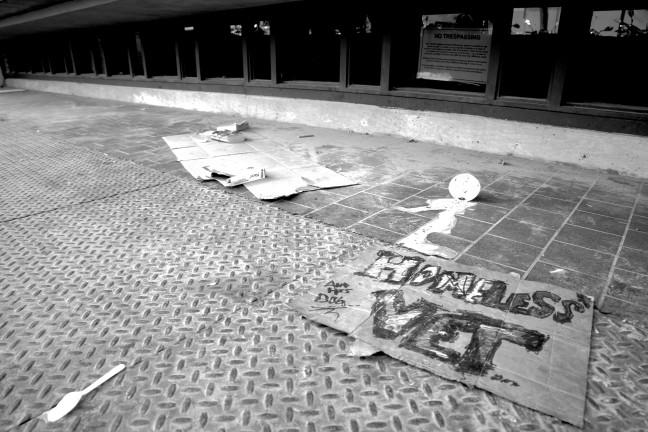In 2017, nearly 22,000 people experiencing homelessness received services and shelter in Wisconsin. On Nov. 27, the State of Wisconsin Interagency Council on Homelessness released a plan entitled “A Hand and Home: Foundations for Success,” which details strategy and policy recommendations for combating homelessness. The plan builds on the “Housing First” mindset, which adopts the belief that all are “housing ready.”
But the WICH plan takes it one step further, arguing that providing housing alone does not solve the underlying issues which cause homelessness. Alongside housing, support services and case management should be provided.
WICH also asserts long-term success must be determined by the number of people moved into independent living with a decreased likelihood of returning to homelessness, rather than the number of people on government programs or in shelters.
Joint Campus Area Committee discusses housing affordability on campus, updates on the ‘Nick’
Finally, they recognize that zero homelessness is unattainable and unrealistic. But the report asserts, “A Wisconsin where homelessness is rare, brief and non-recurring is an achievable goal that we must all strive towards.”
The City of Madison, working with state officials, is on the right track to achieving this goal, but there is certainly room for improvement. Eradicating and minimizing homelessness isn’t an easy task, as Madison has recently discovered.
City officials moved toward the Housing First model of addressing homelessness, which focuses on providing more permanent housing alongside support services. Two such complexes — both subsidized by city, county and federal tax credits — have already been built and have residents in them. Rethke Terrace and Tree Lane Apartments are operated by Heartland Housing and provide a combined 105 units for single chronic and veteran homeless people at Rethke and formerly homeless families at Tree Lane.
Madison awarded almost $2 million in tax credits to create more affordable housing in Madison
These developments came with some undesired consequences. Police calls to the complexes occurred at high volumes in the beginning months, due to many domestic disturbances and large fights in the parking lots. Rethke Terrace, following two stabbings in one week, banned guests to apartments, in an attempt to limit disturbances, but rescinded the ban over fear of violating residents’ rights.
According to Madison Police, the Tree Lane Apartments had 213 police visits since its opening six months ago. The most recent incidents include a female resident being shot through her apartment door and a separate attempted homicide the previous week. Ald. Paul Skidmore, District 9, believes these issues are an effect of the transition process from the streets or shelters to permanent housing.
Mayor Paul Soglin announced in a press conference that Deputy Mayor Gloria Reyes will be assigned the task of monitoring the Tree Lane complex, providing Heartland with recommendations for moving forward.
“We plan to track the calls for service on a daily basis … so that we can respond quickly with any supports that are needed,” Reyes said.
Heartland and the building managers are increasing their support services provided by Young Women’s Christian Association and Madison police asked to extend the hours of uniformed security, while also having a building manager present 24/7.
Hiding homelessness from State Street ignores poverty, further perpetuates systemic inequality
One way that Heartland may be able to combat these issues is by increasing the support services available. All available information indicates that although many support services are available, there is no mandate that ensures their use. By not using these services, independence may not be achievable, and the causes of chronic homelessness not reversed or minimized.
The idea behind Housing First is that it alleviates the burden of finding permanent housing and allows individuals to focus on finding gainful employment and self-reliance. According to WICH, “the homelessness assistance system should help people to resolve their crises, access on-going sources of support in the community and provide basic safety net assistance.” Perhaps one way that this may be achieved is by mandating that individuals living in these facilities participate in these support services.
It must also be remembered that these issues are not widespread. They are caused by an isolated, small number of individuals — most residents are not causing these issues. By implementing stricter policies on disturbances, guests and other issues and tying them to potential eviction, Heartland may be able to minimize the negative behaviors and remove the minority of residents which are causing issues.
Despite progress, homelessness remains a concern in Madison community, organizations say
These shortcomings do not indicate a failure of the Housing First program. Certainly, permanent housing is a much better option than temporary and emergency shelters in the fight against homelessness. There have been successes, helping chronically homeless and at-risk individuals to attain permanent housing.
It’s a valiant effort but requires greater focus on support services and security, and an examination of the current policies. Access to affordable housing must remain a priority, but targeting the root causes of homelessness and joblessness must also be at the forefront. This solution isn’t completely broken — it just needs a change. These individuals need help, but we must recognize the agency of these individuals, help preserve their dignity and give them the respect they deserve.
Andrew Stein ([email protected]) is a senior majoring in political science and economics.





















